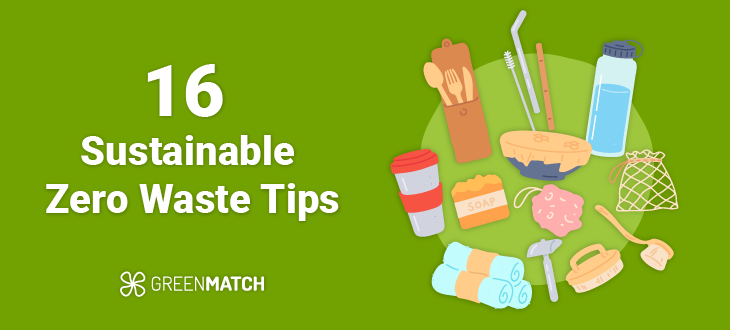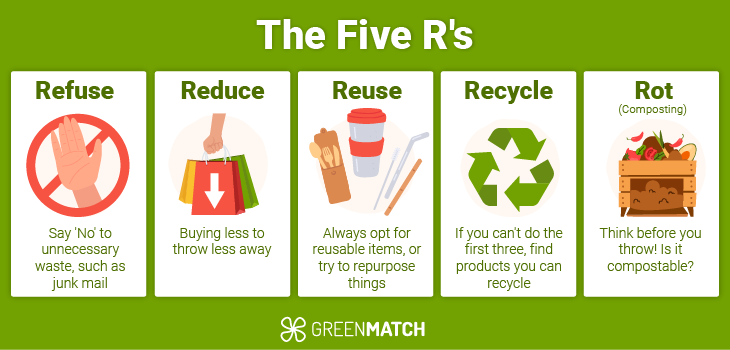- GreenMatch
- Blog
- 16 Sustainable Zero Waste Tips
16 Sustainable Zero Waste Tips for Sustainable Living


Living a zero-waste lifestyle has gained significant attention in recent years. Where convenience often takes priority over environmental impact, there is a growing movement of individuals who are determined to live a more sustainable and eco-friendly lifestyle. One such powerful approach is the concept of zero-waste living.
Embracing a zero-waste lifestyle means minimising waste, reducing our carbon footprint, and maximising resource efficiency through reuse and recycling. While zero-waste living can sound daunting, we can all take small steps that can significantly impact our environment.
In this article, we've consulted the experts, from green bloggers to environmental specialists, to bring you a complete list of simple, practical tips and advice to help you start your journey to a sustainable zero-waste lifestyle.
- 1. Waste Audit
- 2. Refuse
- 3. Reduce
- 4. Reuse (or Repurpose)
- 5. Recycle
- 6. Compost (Rot)
- 7. Repair
- 8. Borrow, Swap or Share
- 9. Avoid Single-Use Plastic
- 10. Try Homemade Products
- 11. Clothing Considerations
- 12. Seek Out Zero-Waste Products
- 13. Food Waste
- 14. Pet Product Alternatives
- 15. New Technology Solutions
- 16. Raise Awareness
At its core, zero sustainable waste living revolves around a few fundamental principles. Usually known as 'Reduce, Reuse and Recycle', these principles encourage people to rethink how they use and dispose of everyday items, like food, packaging and single-use goods.
By adhering to these shared principles and applying them to all avenues of life, we can play an active role in reducing waste, conserving resources, and creating a more sustainable lifestyle.
Chinmay Daflapurkar, from Express Demo & Waste, shared their thoughts with us on adapting to this new lifestyle:
The journey towards zero waste begins with a fundamental mindset shift. Instead of focusing solely on recycling or reducing waste, individuals must embrace the concept of waste prevention. We can significantly minimise waste generation by questioning our consumption patterns and making conscious choices. Start by evaluating the necessity of each purchase, opting for reusable alternatives, and repairing or repurposing items whenever possible.
Moreover, the zero waste market is estimated to grow by 122.15% between 2021 and 2028. Industry analysts estimate that the zero-waste packaging market will grow at a CAGR of 13.2% from 2021 to 2026. The industry has seen a growth rate of 16.41% over the past year, supported by 52,400 patents and 5,830 grants awarded.
In addition, the industry employs over 3 million workers globally, with an employee growth of 167,200 in the last year. These statistics underscore the significant global efforts and progress to achieve zero waste goals.
Living sustainably is about much more than just avoiding plastic and recycling. Many steps can be taken to assess and reduce our waste, but we can also do more to educate, encourage change and share practical tips. With that in mind, let's get into our list of top tips!
Here are 16 practical tips to help you start your journey towards a zero-waste lifestyle.
1. Waste Audit (Rethink Your Consumption Habits)
The first step to zero-waste living is to assess your consumption patterns. Be mindful of your purchase and ask yourself if you truly need it. Prioritise buying only what is essential and invest in high-quality, durable products that will last longer.
During our research, many contributors emphasized the importance of evaluating the amount of waste you currently generate. This evaluation is considered a crucial first step in starting your zero-waste journey. By undertaking an audit on your waste levels, you can identify areas where you could cut back and make changes.
These are useful for businesses but can also be done around the home. Once you start noticing wasteful practices, you can switch things up and use the concept of the 'Five R's: Refuse, Reduce, Reuse, Recycle and Rot '(Composting). We've outlined these in more detail below.
2. Refuse Single-Use Items
Say no to single-use items such as plastic bags, disposable cutlery, and straws. Carry reusable alternatives like cloth bags, stainless steel cutlery, and a reusable water bottle with you wherever you go.
The concept of 'Refuse' is actively trying to avoid buying or accepting items you don't need. For example, junk leaflets or brochures that come through your door often end up in the recycling bin.
This includes saying no to freebies or promotional items like plastic pens or stress balls. Things that are destined to break or head straight for your bin.
There are a couple of tips to help you avoid receiving things through the letterbox that you don't want or need. First, put up a notice, or sticker, on your door that politely states advertisements are not wanted.
Secondly, consider asking utility companies who send you paper-based correspondence to send you emails instead. Both tactics can help you reduce the amount of paper or cardboard you receive unexpectedly.
Always look for opportunities to say 'no' to extra waste.
Refuse what you do not need; reduce what you do need; reuse what you consume; recycle what you cannot refuse, reduce, or reuse; and rot (compost) the rest.
3. Reduce
'Reduce' is all about decluttering and bringing less into your home. The less you buy, the less waste you will accumulate.
Reducing can mean donating excess things to charity shops to be reused or simply shopping less often and only buying the things you need. Cutting down on activities or purchases that generate waste is a great place to start building a zero-waste mentality.
One area we can all try to reduce is paper waste. Whether at home or in the workplace, trying to go digital at every opportunity can help us reduce the need to print paper. It can help us avoid needing additional materials like plastic pens and develop a culture of being more intentional and thinking ahead about waste.
Bulk buying is another fantastic way to include the 'reduce' principle. Buying in bulk not only saves money but also reduces packaging waste. Bring your reusable containers or bags for dry goods, grains, and other pantry essentials.
Moreover, when we buy in bulk, we can lessen the amount of packaging we have to deal with and the less frequently we will need to buy more. If you need to order specialist items, bulk buying online can also reduce the carbon footprint of any necessary shipping - one delivery is better than two!
By embracing a zero waste lifestyle, we can significantly reduce our environmental impact and contribute to a more sustainable future for generations to come.
4. Embrace Reuseable (or Repurpose)
Incorporate reusable items into your daily routine. Use cloth napkins instead of paper towels, opt for refillable containers for toiletries and cleaning products, and switch to rechargeable batteries.
This concept has become more commonly used in recent years as more campaigns have appeared to help us adopt this change. You might have noticed this principle in 'bags for life' or material bags in grocery stores for fresh produce. These swaps encourage people to opt for reusable items rather than disposable, single-use ones.
We can adopt the 'Reuse' idea in lots of other ways as well, for example:
- Using personal water bottles instead of plastic ones;
- Strong material shopping bags;
- Metal straws
- Jars for food storage
- Reusable coffee cups
These small changes can significantly reduce your waste output. For instance, if we consider the things we use daily as single-use, disposable items, we can begin swapping these for reusable, sustainable options. Luckily, more solutions are available to make these swaps more straightforward. We'll discover more of these clever ideas in the article!
5. Recycle
This step is one of the most important and perhaps the one we are all most familiar with.
Nowadays, recycling is commonplace in households across the country. This act allowed us all to recycle from home - and saw many of us introduced to a multi-coloured bin system! Surprisingly, we've only had doorstep recycling services in the UK since 2003, when the Household Waste Recycling Act was introduced.
While recycling is integral to reducing waste that goes to landfills, it's not quite a zero-waste solution. This is why recycling is the 4th 'R'. If we can refuse, reduce or reuse first, this lessens the need to recycle, saving us from contributing further environmental emissions. So we should try to recycle less, not more.
That said, if some items we need for daily life cannot be swapped for zero-waste alternatives, it is ideal if they can be recycled instead.
6. Composting (Rot)
The last 'R' stands for 'Rot', or composting. This step is a great way to divert more waste from our landfills, and it creates a by-product that we can use to nourish our plants and gardens.
Start composting your food waste and yard trimmings. Composting allows organic matter to decompose naturally, creating nutrient-rich soil that can be used in your garden. If you don’t have outdoor space, explore indoor composting options like vermicomposting using worms.
You can use different ways to compost and other 'systems'. However, compost can be made from various waste products, from rotten foods and grass cuttings to coffee grounds and tea bags.
Researching different techniques and finding the right system for your home is essential. This method can, however, significantly reduce the amount of waste you put into your bin, as so many daily items can be composted instead.
Also, if composting is not for you, try asking friends and neighbours if they compost. This way, you can contribute your waste items to their compost pile instead - and still benefit from less waste! If you want to compost but don't see a need for the final product, you could try donating it to local projects or people in your community.
7. Repair
Although not technically considered one of the 'R's, this tip is another excellent idea to lessen waste. If the products, clothes, or furniture we own break or get damaged, we might throw them away and get a new one.
Instead, we could consider repair options. Seeking help from a tailor or seamstress or even visiting a cobbler can be all we need to save an item. We can do many things with broken items we might not have considered.
Similarly, we could explore upcycling or repair options when we need something. For example, visiting charity shops to look for furniture we could repair and improve. We could also find clothing that could be mended or made into something new.
Taking something existing and bringing it back to life, giving it a new purpose is a great way to avoid adding to waste piles. It can also be a rewarding and exciting project for someone interested in design or crafts.
8. Borrow, Swap or Share
This tip offers a great chance to connect with the community (or just friends and family if you're shy!)
If you need something particular but not something you will need long term, see if you can source one to borrow. Equally, offering others something you don't mind sharing is a great way to help others reduce unnecessary purchases.
Examples include camping equipment, party supplies or fancy dress clothes. You might even want to host a 'swap shop' so people can find items they need in return for getting rid of things they no longer use.
The concept behind this idea is that we should only focus on owning things we know will last us a long time and also try to reduce buying more things. It's an excellent tip for reducing waste and improving our bank balance!

9. Avoid Single-Use Plastic
Single-use plastic is classed as anything you can only use once. This might include the packaging on food, labels or containers. There are vast amounts of single-use plastic in circulation, and there are numerous reasons why we should all try to avoid our reliance on it.
Here are just a few facts that are good to know:
- Plastic bags, straws, bottles and utensils cause harmful pollution to our ecosystems. They take hundreds of years to decompose and cause long-term environmental damage. They often end up in landfills or find their way into water bodies, endangering marine life and polluting our oceans.
- Producing single-use plastics production of single-use plastics consumes vast amounts of natural resources, including fossil fuels and water.
- The extraction of fossil fuels for plastic production and the energy-intensive manufacturing processes release carbon dioxide and other harmful pollutants into the atmosphere.
- The manufacturing and disposal of single-use plastics contribute to greenhouse gas emissions, exacerbating climate change.
- Single-use plastics pose risks to human health. Chemical additives in plastic products, such as bisphenol A (BPA) and phthalates, can leach into food and beverages, potentially disrupting hormone balance and causing other health issues.
- As single-use plastics break down over time, they can fragment into microplastics - tiny particles less than 5mm in size. These microplastics are pervasive in our environment and have been found in soil, water, and even the air we breathe. They can enter the food chain and have unknown long-term consequences for human and animal health.
Reducing our reliance on all plastic products, specifically single-use plastics, is paramount to protecting our environment, animals, and ourselves. One way we can become more eco-friendly and reduce plastic's harmful impact is to be mindful of how we shop and dispose of it.
For example:
- The best thing we can do is avoid it or opt for reusable alternatives.
- Choose items with minimal packaging or packaging that can be composted or recycled.
- Replace plastic bags with cloth or mesh alternatives.
- Choose reusable water bottles and coffee cups made from sustainable materials.
- Request no plastic packaging in online orders if it's an option.
- Stop using plastic straws; find a reusable version made from sustainable materials such as stainless steel or bamboo.
- Look closely at what products are made of. You might be surprised to learn that items such as tea bags can contain microplastics (several brands have recently changed this, but some continue to use them).
- Swap simple items, like plastic razors, for metal. This applies to many toiletries, such as toothbrushes, toothpaste tubes, and floss. Seek non-plastic alternatives.
- Most female sanitary products also contain single-use plastics and are non-biodegradable or compostable. However, many new options, such as reusable and sustainable menstrual cups, period underwear, and flushable pads, are now available.
We can actively mitigate environmental, social, and health issues by avoiding single-use plastics. Choosing reusable alternatives helps reduce the demand for single-use plastics and promotes a more sustainable future.
10. Try Homemade Products
To help avoid plastic waste, many people like to create their own products. Homemade products can have many uses, and there are numerous natural alternatives for most items we use daily in our homes.
Here are some examples of items that may be made at home (specific ingredients should be well-researched before you try any of these ideas):
- Make your fabric freshening spray
- Countertop cleaning spray
- Washing machine cleaner
- Toilet cleaner
- Homemade deodorant
- Mouthwash
- Lip balm
- Face masks
Most of these items, when purchased, come in plastic containers, so it's great to know that you can find an alternative solution. If you're not one for creating your products, however, it is worth researching new or independent companies creating zero-waste versions of these items. Many companies are now trying harder to produce products for eco-conscious buyers, so it's a great time to find a new favourite.
11. Clothing Considerations
We've already seen that repairing and sharing clothing is a great way to reduce waste and avoid making new purchases. However, sometimes, we need something new.
This tip always considers second-hand (or 'pre-loved') clothing before buying new. This makes your purchase more sustainable, as it hasn't involved any new manufacturing or use of resources.
Very often, we get drawn into buying brand-new clothing because of sales or discounts, but we're constantly not thinking about the impact the making of these items is having on the planet.
If you can't find what you're looking for as a second-hand item - either online or via social media - try to find out if the companies you're using are ethically and sustainably sourcing their products and materials.
12. Seek Out Zero-Waste Products
This may sound like an obvious tip, but we recognise that not everyone can cut down and reduce to the mentioned levels. It is worth knowing that many brands and businesses have recently started to adopt or be more mindful of zero-waste practices.
One great way to find zero-waste, sustainable products is by shopping locally, at farmer's markets or greengrocers for produce. They often don't come packaged, so it's an excellent way to avoid bringing more plastic home.
By paying attention to brands that make zero-waste products, you could also find some straightforward swaps that you can make that won't significantly impact your day-to-day activities. For example, suppose you switch to a deodorant or hand soap that is plastic-free or produced sustainably. In that case, you've already made an outstanding environmental contribution with a tiny change.
The beauty and toiletries sector offers many options, so watch for them!
We don't need a handful of people doing zero waste perfectly. We need millions of people doing it imperfectly.
13. Food Waste
A zero-food waste approach focuses on only buying and using the necessary food. To try this step, consider planning meals, practising portion control and using any leftovers.
This idea also helps you avoid takeaways or picking up pre-packaged lunches, which often use a lot of plastics and are harmful to the environment. By planning, you can reduce your waste significantly.
Planning your meals can greatly reduce food waste. Create a weekly meal plan, focusing on using ingredients you already have. Here’s a sample zero-waste meal plan:
- Breakfast: Banana pancakes with fruit sauce
- Lunch: Green salad with seasonal vegetables
- Dinner: Polenta with ratatouille
14. Pet Product Alternatives
For those homes with pets, you might be wondering how you could reduce waste with all that your animals require. There are, however, some tips and tricks you could try.
If your pet's food comes in plastic wrappers, it cannot be easy to source alternatives from local supermarkets. However, if you take a trip online, you might be surprised to find more sustainable pet food companies that can deliver to your door.
Equally, you can find pet toys and items like collars or leads made from more sustainable materials. Some companies offer bamboo collars or natural fibre bedding.
Whatever type of beloved pet you own, it's worth trying to obtain natural products for their benefit and that of the environment!
15. New Technology Solutions
Adopting zero-waste practices can seem huge, but technology has recently helped support these efforts, from waste management apps to more innovative packaging solutions.
Jon Morgan, CEO of Venture Smarter, believes new technologies may help us all become more sustainable:
Individuals and organisations can calculate their waste generation, recycling rates, and composting volumes. This data can be compared over time to gauge progress and identify areas for improvement. Online platforms and apps can facilitate waste tracking and provide insights into individual and collective waste reduction efforts.
As more apps and technical solutions become more widely available, more people will be able to benefit. New technologies, such as 'smart compost bins' and unique packaging (like compostable and even edible packaging!), will help to make the problematic zero waste changes much more manageable. These innovations will significantly ease the transition to a zero waste lifestyle.
16. Raise Awareness
It's vital that throughout our efforts, we also take the time to raise awareness about the choices we make and why they're so important. Taking action alone makes a difference but won't create real change unless more people get involved.
One of the key ways we can share the benefits and get help to do more is through government support. One of the experts we spoke to, Mariusz Baran, owner of We Clear Everything, is a supporter of the advances the government have already made:
Having worked closely with local governments, I have witnessed the positive impact of implementing recycling programs and educating residents. For instance, our city introduced a comprehensive recycling initiative, including curbside recycling bins and educational campaigns on proper waste separation. They also organised community events, such as composting workshops, to engage citizens and provide them with the necessary tools to embrace a zero-waste mentality.
The phrase' sharing is caring' really applies here! The more we speak to local leaders, community groups, schools and businesses, the more we can support educating one another in reducing waste. After all - we all produce waste daily, and the only way that will change is if we become aware of how to do so.
The European Commission proposed a targeted revision of the Waste Framework Directive to reduce food waste by 10% in processing and manufacturing and 30% at retail and consumption levels by 2030.
Connecting with others is also a great way to share tips and advice and collaborate on new ideas, like hosting workshops or fun days.
Conclusions
As we face further and more extreme environmental challenges, adopting a zero-waste lifestyle is a personal and collective goal with immense significance.
This blog has explored practical tips for reducing waste and embracing sustainability in our everyday lives. Now, let's recap why these efforts are crucial and how the small actions we take today will have a profound impact in the long run.
Living a zero-waste lifestyle is so important because it allows us to minimise our environmental impact and preserve the health of our planet. Reducing waste mitigates pollution, conserves natural resources, and protects fragile ecosystems. Moreover, by choosing reusable alternatives and opting for sustainable practices, we can inspire others and create a ripple effect that leads to broader change.
Every small action we take matters. Even the simplest choices, such as carrying a reusable water bottle, refusing single-use plastic bags, or composting organic waste, significantly reduce waste over time. By making these conscious decisions, we directly and positively impact the environment.
It's worth acknowledging that embracing a zero-waste lifestyle may present challenges. Sustainable options are only readily available to some. However, we must stay encouraged.
Every time we check a label or swap an item for one in sustainable packaging, we're making a difference.
We pave the way for a future where we minimise waste generation, conserve resources, and prioritise the well-being of our planet by pursuing zero waste goals.

Becky is an experienced SEO content writer specialising in sustainability and renewable trends. Her background in broadcast journalism inspires reliable content to help readers live more sustainably every day.
We strive to connect our customers with the right product and supplier. Would you like to be part of GreenMatch?

- 1. Waste Audit
- 2. Refuse
- 3. Reduce
- 4. Reuse (or Repurpose)
- 5. Recycle
- 6. Compost (Rot)
- 7. Repair
- 8. Borrow, Swap or Share
- 9. Avoid Single-Use Plastic
- 10. Try Homemade Products
- 11. Clothing Considerations
- 12. Seek Out Zero-Waste Products
- 13. Food Waste
- 14. Pet Product Alternatives
- 15. New Technology Solutions
- 16. Raise Awareness




